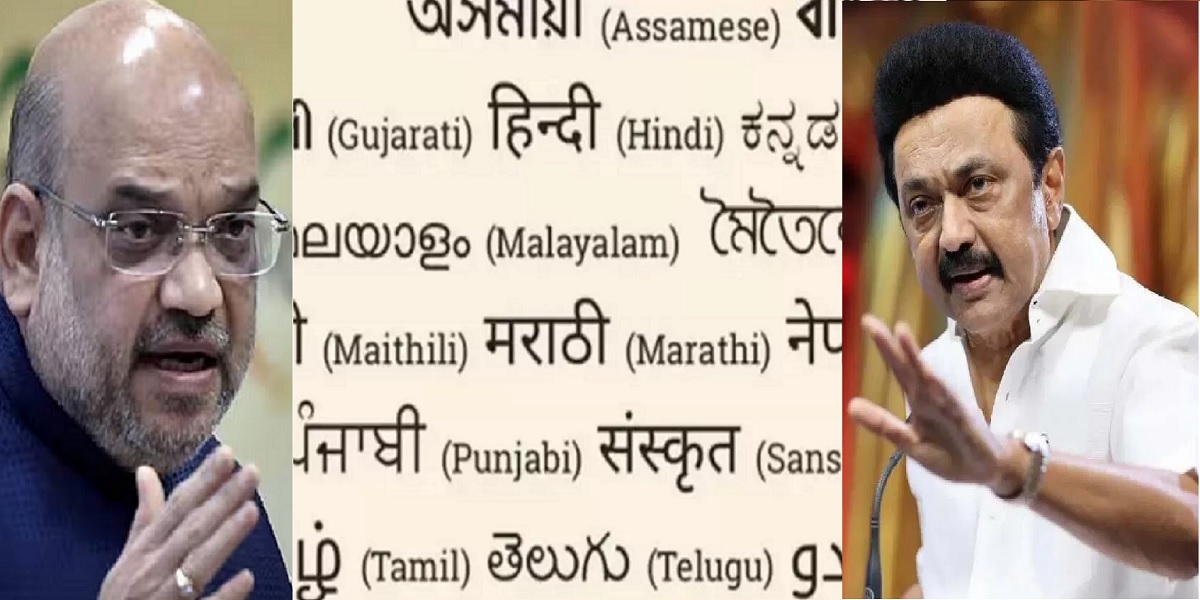Stalin was responding to Union Minister Amit Shah's observation that Hindi will be accepted unopposed all over India.

Tamil Nadu will not allow Hindi hegemony or its imposition, Chief Minister MK Stalin categorically said on Saturday, 5 August.
Denouncing Union Home Minister Amit Shah’s assertion that Hindi would slowly be accepted unopposed all across the country, Stalin in a tweet said: “Our language (Tamil) and heritage define us — we won’t be enslaved by Hindi!”
Shah made the assertion while chairing the 38th meeting of the Committee of Parliament on Official Language in New Delhi on Friday, 4 August. He further said that Hindi was not competing with local languages and that the promotion of all Indian languages would empower the nation.
The minister added that the acceptance of the Union’s official language would not be by any law or circular but from goodwill, inspiration, and encouragement.
Stalin said he was denouncing Shah’s audacious push for Hindi acceptance.
“It’s a blatant attempt to subjugate non-Hindi speakers. Tamil Nadu rejects any form of Hindi hegemony and imposition,” he tweeted.
I strongly denounce Union Home Minister @AmitShah's audacious push for Hindi acceptance. It's a blatant attempt to subjugate non-Hindi speakers. Tamil Nadu rejects any form of Hindi hegemony and imposition. Our language and heritage define us – we won't be enslaved by Hindi!… pic.twitter.com/gNiJ2TGtKm
— M.K.Stalin (@mkstalin) August 5, 2023
Pointing out that several states, including Karnataka and West Bengal, have also been resisting the imposition of Hindi, the chief minister said: “Hon’ble Amit Shah, please take heed of the growing resistance! Igniting the embers of the ‘1965 Anti-Hindi Imposition Agitations’ would be an unwise move.”
According to official estimates, as many as 70 people were killed in the second anti-Hindi stir — spearheaded mostly by students — in Tamil Nadu that went on for two months from 25 January, 1965.
The situation returned to normal after the then prime minister Lal Bahadur Shastri assured that English would be used as the official language as long as the non-Hindi speaking states wanted.
Responding to the chief minister, BJP state president K Annamalai sought to know what Stalin was doing when the former Union home minister P Chidambaram made over 170 recommendations on implementing Hindi in 2011.
When former Home Minister Thiru @PChidambaram_IN avl gave over 170 recommendations on implementing Hindi in 2011, what was Thiru @mkstalin avl doing?
Did CBI, ED & IT raid by your alliance partner hurt you badly that you took a mouna vradh? Why is Thiru @mkstalin quoting the Hon… https://t.co/SlVzczhJqG
— K.Annamalai (மோடியின் குடும்பம்) (@annamalai_k) August 5, 2023
“For the first time, CBSE, including for those schools run by the Gopalapuram family, has laid greater emphasis on promoting regional languages. If an award was given for Double Standards & Hypocrisy, Stalin would win it hands down!” Annamalai tweeted.
Gopalapuram referred to the late K Karunanidhi’s residence.
It may be recalled that the Official Language Committee headed by Shah in September last submitted the 11th Volume of its report to President Droupadi Murmu.
Although not available in the public domain, it was widely reported that the report recommended Hindi to be used in the Union government’s higher-education institutions like the IITs, IIMs, and AIIMSes.
The move faced stiff opposition from non-Hindi-speaking states, especially in South India.
Though the Constitution recognises 22 languages including Tamil, Telugu, Kannada, and Malayalam under the Eighth Schedule, as Scheduled Languages, Justice Dipankar Datta of the Supreme Court, recently refused to transfer a case from Farrukhabad in Uttar Pradesh to Darjeeling in West Bengal.
The petitioner sought the transfer citing the language barrier. The court refused to grant the request stating that the petitioner shall communicate and convey in Hindi since “it is the national language”.
According to the Constitution, India does not have a national language. However, Indian English and Modern Hindi are the official languages.
“If the contention of the petitioner is to be accepted, it is the claimants who would be seriously prejudiced not being in a position to communicate and convey their version in Bengali,” the court said.